Group Assignment: Business and Corporate Law Case Study Analysis
VerifiedAdded on 2023/01/05
|9
|2394
|34
Project
AI Summary
This document presents a comprehensive solution to a group assignment in Business and Corporate Law (HI6027) at Holmes Institute. The assignment involves the analysis of two case studies, applying relevant legal rules and case precedents. Part A focuses on contract law, specifically addressing the formation of a unilateral contract and its revocation, examining the liabilities of a restaurant chain in a promotional competition. Part B delves into corporate law, analyzing the doctrine of indoor management and the powers of company agents, particularly in the context of a loan agreement and its validity under the Corporations Act 2001 (Cth). The solution critically examines ethical implications, obligations, rights, and remedies, offering a thorough understanding of the legal framework governing business and corporate dealings.
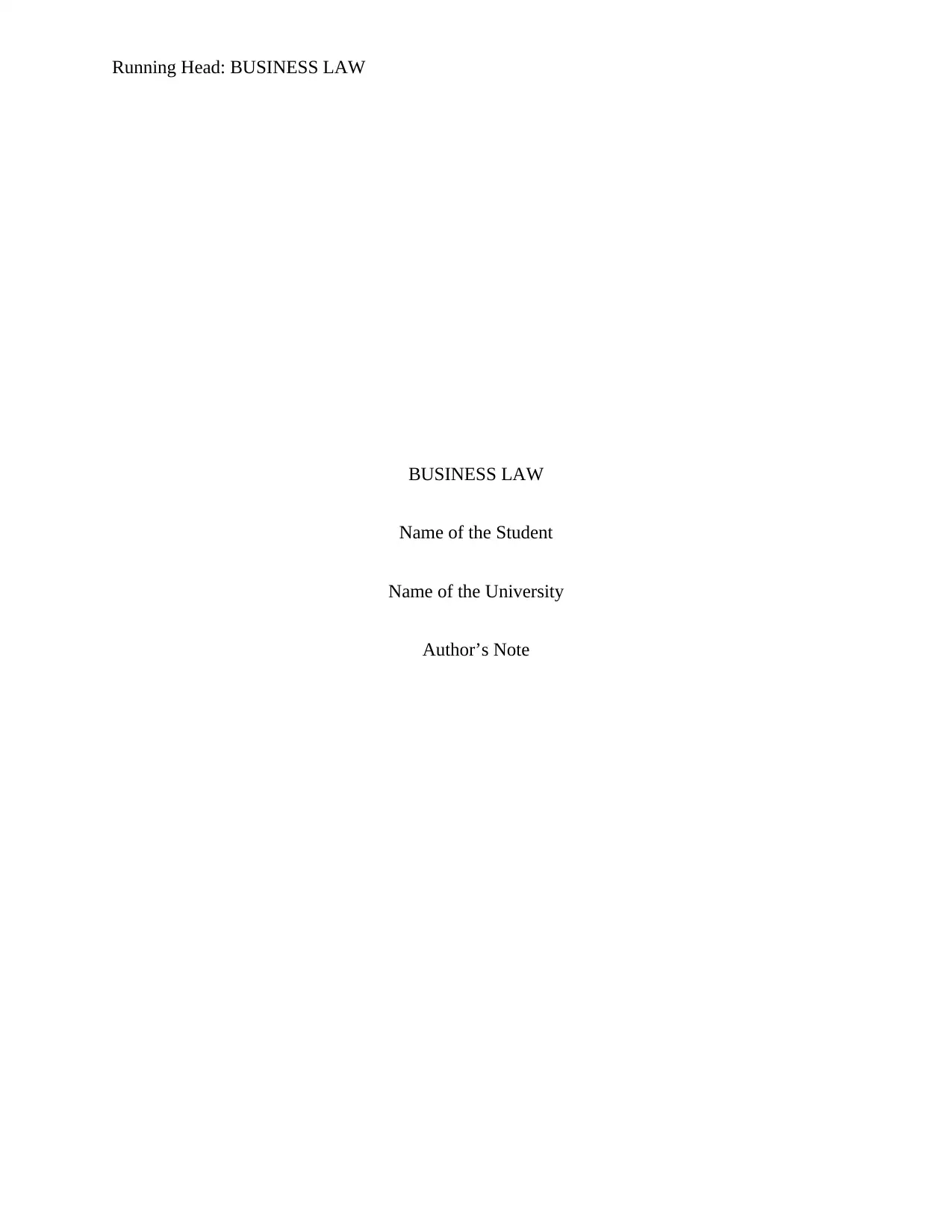
Running Head: BUSINESS LAW
BUSINESS LAW
Name of the Student
Name of the University
Author’s Note
BUSINESS LAW
Name of the Student
Name of the University
Author’s Note
Paraphrase This Document
Need a fresh take? Get an instant paraphrase of this document with our AI Paraphraser
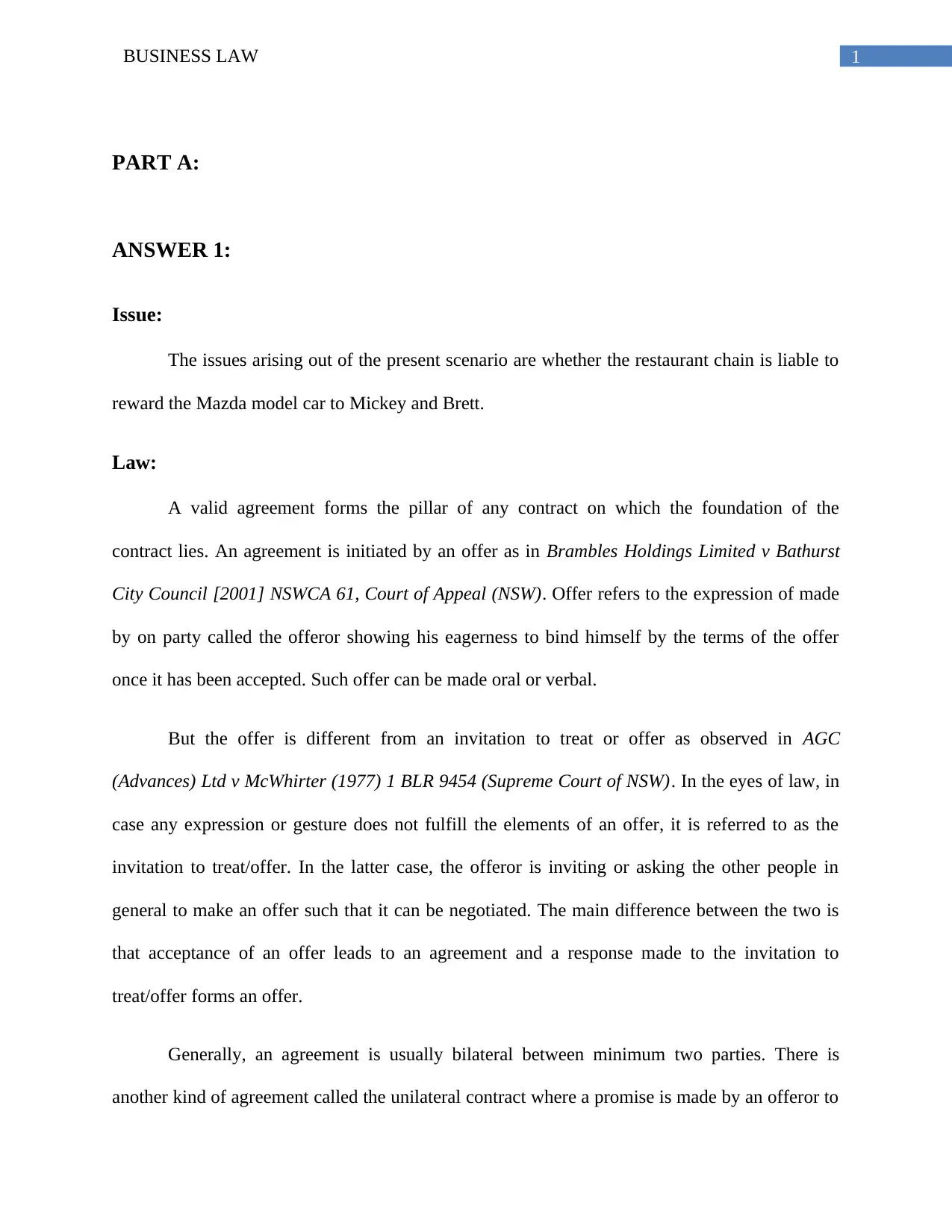
1BUSINESS LAW
PART A:
ANSWER 1:
Issue:
The issues arising out of the present scenario are whether the restaurant chain is liable to
reward the Mazda model car to Mickey and Brett.
Law:
A valid agreement forms the pillar of any contract on which the foundation of the
contract lies. An agreement is initiated by an offer as in Brambles Holdings Limited v Bathurst
City Council [2001] NSWCA 61, Court of Appeal (NSW). Offer refers to the expression of made
by on party called the offeror showing his eagerness to bind himself by the terms of the offer
once it has been accepted. Such offer can be made oral or verbal.
But the offer is different from an invitation to treat or offer as observed in AGC
(Advances) Ltd v McWhirter (1977) 1 BLR 9454 (Supreme Court of NSW). In the eyes of law, in
case any expression or gesture does not fulfill the elements of an offer, it is referred to as the
invitation to treat/offer. In the latter case, the offeror is inviting or asking the other people in
general to make an offer such that it can be negotiated. The main difference between the two is
that acceptance of an offer leads to an agreement and a response made to the invitation to
treat/offer forms an offer.
Generally, an agreement is usually bilateral between minimum two parties. There is
another kind of agreement called the unilateral contract where a promise is made by an offeror to
PART A:
ANSWER 1:
Issue:
The issues arising out of the present scenario are whether the restaurant chain is liable to
reward the Mazda model car to Mickey and Brett.
Law:
A valid agreement forms the pillar of any contract on which the foundation of the
contract lies. An agreement is initiated by an offer as in Brambles Holdings Limited v Bathurst
City Council [2001] NSWCA 61, Court of Appeal (NSW). Offer refers to the expression of made
by on party called the offeror showing his eagerness to bind himself by the terms of the offer
once it has been accepted. Such offer can be made oral or verbal.
But the offer is different from an invitation to treat or offer as observed in AGC
(Advances) Ltd v McWhirter (1977) 1 BLR 9454 (Supreme Court of NSW). In the eyes of law, in
case any expression or gesture does not fulfill the elements of an offer, it is referred to as the
invitation to treat/offer. In the latter case, the offeror is inviting or asking the other people in
general to make an offer such that it can be negotiated. The main difference between the two is
that acceptance of an offer leads to an agreement and a response made to the invitation to
treat/offer forms an offer.
Generally, an agreement is usually bilateral between minimum two parties. There is
another kind of agreement called the unilateral contract where a promise is made by an offeror to
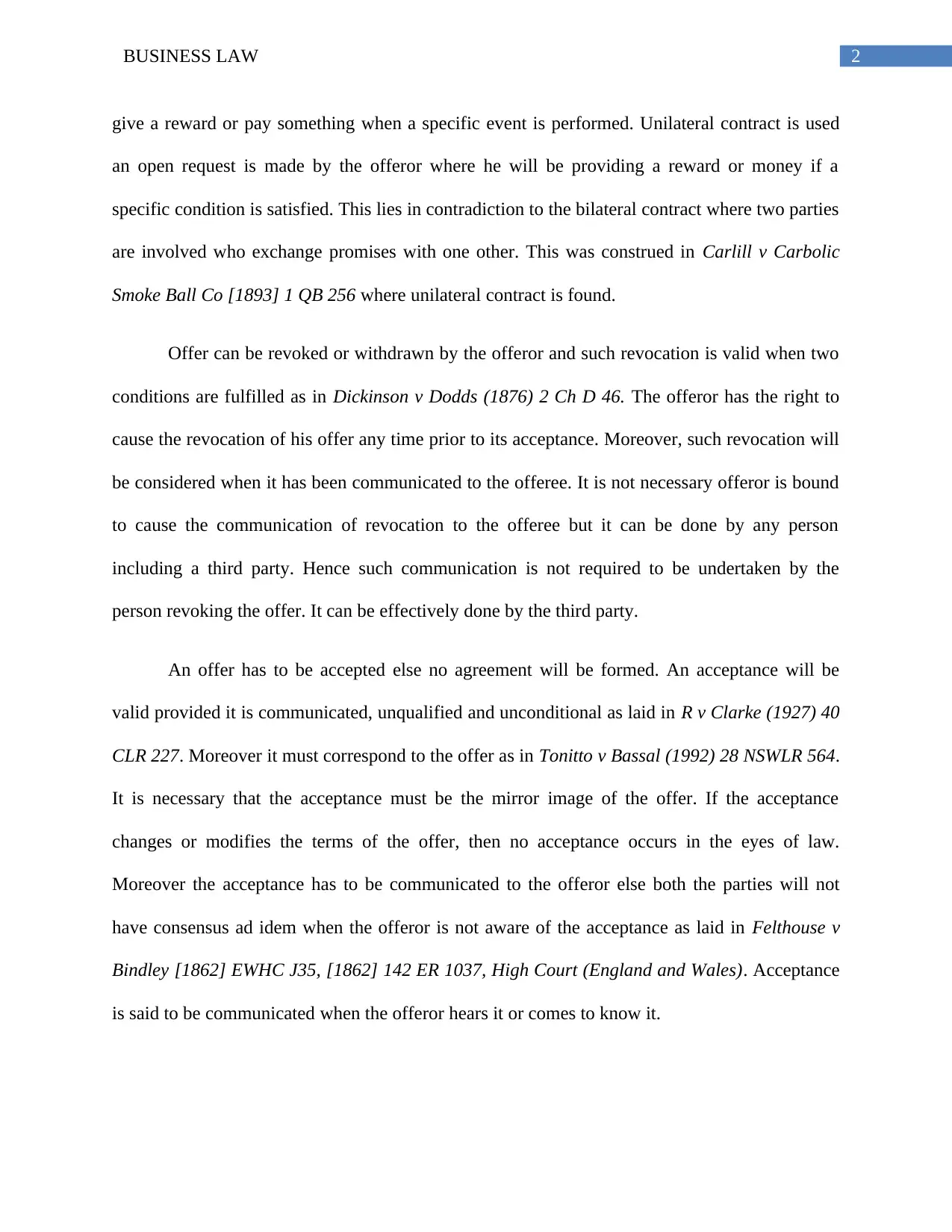
2BUSINESS LAW
give a reward or pay something when a specific event is performed. Unilateral contract is used
an open request is made by the offeror where he will be providing a reward or money if a
specific condition is satisfied. This lies in contradiction to the bilateral contract where two parties
are involved who exchange promises with one other. This was construed in Carlill v Carbolic
Smoke Ball Co [1893] 1 QB 256 where unilateral contract is found.
Offer can be revoked or withdrawn by the offeror and such revocation is valid when two
conditions are fulfilled as in Dickinson v Dodds (1876) 2 Ch D 46. The offeror has the right to
cause the revocation of his offer any time prior to its acceptance. Moreover, such revocation will
be considered when it has been communicated to the offeree. It is not necessary offeror is bound
to cause the communication of revocation to the offeree but it can be done by any person
including a third party. Hence such communication is not required to be undertaken by the
person revoking the offer. It can be effectively done by the third party.
An offer has to be accepted else no agreement will be formed. An acceptance will be
valid provided it is communicated, unqualified and unconditional as laid in R v Clarke (1927) 40
CLR 227. Moreover it must correspond to the offer as in Tonitto v Bassal (1992) 28 NSWLR 564.
It is necessary that the acceptance must be the mirror image of the offer. If the acceptance
changes or modifies the terms of the offer, then no acceptance occurs in the eyes of law.
Moreover the acceptance has to be communicated to the offeror else both the parties will not
have consensus ad idem when the offeror is not aware of the acceptance as laid in Felthouse v
Bindley [1862] EWHC J35, [1862] 142 ER 1037, High Court (England and Wales). Acceptance
is said to be communicated when the offeror hears it or comes to know it.
give a reward or pay something when a specific event is performed. Unilateral contract is used
an open request is made by the offeror where he will be providing a reward or money if a
specific condition is satisfied. This lies in contradiction to the bilateral contract where two parties
are involved who exchange promises with one other. This was construed in Carlill v Carbolic
Smoke Ball Co [1893] 1 QB 256 where unilateral contract is found.
Offer can be revoked or withdrawn by the offeror and such revocation is valid when two
conditions are fulfilled as in Dickinson v Dodds (1876) 2 Ch D 46. The offeror has the right to
cause the revocation of his offer any time prior to its acceptance. Moreover, such revocation will
be considered when it has been communicated to the offeree. It is not necessary offeror is bound
to cause the communication of revocation to the offeree but it can be done by any person
including a third party. Hence such communication is not required to be undertaken by the
person revoking the offer. It can be effectively done by the third party.
An offer has to be accepted else no agreement will be formed. An acceptance will be
valid provided it is communicated, unqualified and unconditional as laid in R v Clarke (1927) 40
CLR 227. Moreover it must correspond to the offer as in Tonitto v Bassal (1992) 28 NSWLR 564.
It is necessary that the acceptance must be the mirror image of the offer. If the acceptance
changes or modifies the terms of the offer, then no acceptance occurs in the eyes of law.
Moreover the acceptance has to be communicated to the offeror else both the parties will not
have consensus ad idem when the offeror is not aware of the acceptance as laid in Felthouse v
Bindley [1862] EWHC J35, [1862] 142 ER 1037, High Court (England and Wales). Acceptance
is said to be communicated when the offeror hears it or comes to know it.
⊘ This is a preview!⊘
Do you want full access?
Subscribe today to unlock all pages.

Trusted by 1+ million students worldwide
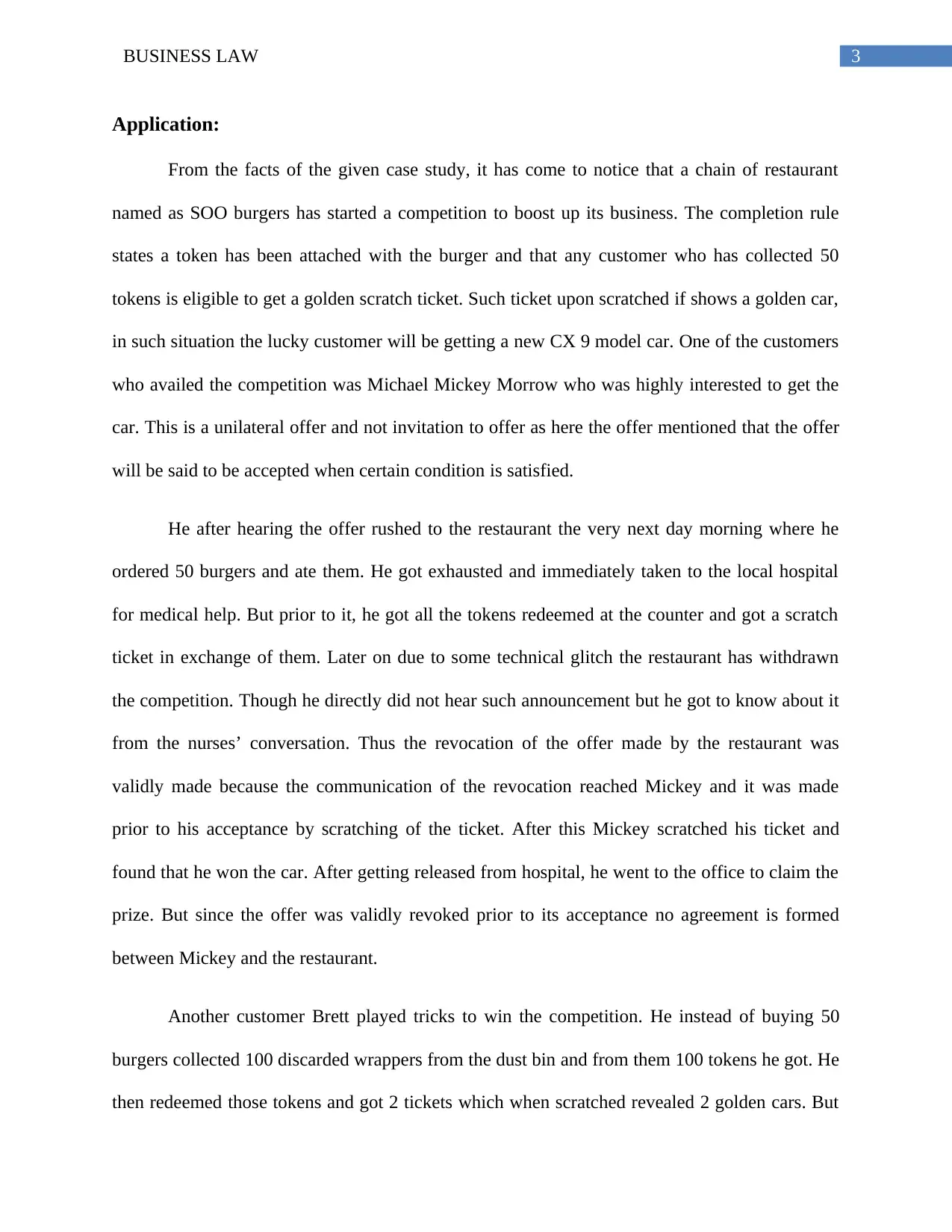
3BUSINESS LAW
Application:
From the facts of the given case study, it has come to notice that a chain of restaurant
named as SOO burgers has started a competition to boost up its business. The completion rule
states a token has been attached with the burger and that any customer who has collected 50
tokens is eligible to get a golden scratch ticket. Such ticket upon scratched if shows a golden car,
in such situation the lucky customer will be getting a new CX 9 model car. One of the customers
who availed the competition was Michael Mickey Morrow who was highly interested to get the
car. This is a unilateral offer and not invitation to offer as here the offer mentioned that the offer
will be said to be accepted when certain condition is satisfied.
He after hearing the offer rushed to the restaurant the very next day morning where he
ordered 50 burgers and ate them. He got exhausted and immediately taken to the local hospital
for medical help. But prior to it, he got all the tokens redeemed at the counter and got a scratch
ticket in exchange of them. Later on due to some technical glitch the restaurant has withdrawn
the competition. Though he directly did not hear such announcement but he got to know about it
from the nurses’ conversation. Thus the revocation of the offer made by the restaurant was
validly made because the communication of the revocation reached Mickey and it was made
prior to his acceptance by scratching of the ticket. After this Mickey scratched his ticket and
found that he won the car. After getting released from hospital, he went to the office to claim the
prize. But since the offer was validly revoked prior to its acceptance no agreement is formed
between Mickey and the restaurant.
Another customer Brett played tricks to win the competition. He instead of buying 50
burgers collected 100 discarded wrappers from the dust bin and from them 100 tokens he got. He
then redeemed those tokens and got 2 tickets which when scratched revealed 2 golden cars. But
Application:
From the facts of the given case study, it has come to notice that a chain of restaurant
named as SOO burgers has started a competition to boost up its business. The completion rule
states a token has been attached with the burger and that any customer who has collected 50
tokens is eligible to get a golden scratch ticket. Such ticket upon scratched if shows a golden car,
in such situation the lucky customer will be getting a new CX 9 model car. One of the customers
who availed the competition was Michael Mickey Morrow who was highly interested to get the
car. This is a unilateral offer and not invitation to offer as here the offer mentioned that the offer
will be said to be accepted when certain condition is satisfied.
He after hearing the offer rushed to the restaurant the very next day morning where he
ordered 50 burgers and ate them. He got exhausted and immediately taken to the local hospital
for medical help. But prior to it, he got all the tokens redeemed at the counter and got a scratch
ticket in exchange of them. Later on due to some technical glitch the restaurant has withdrawn
the competition. Though he directly did not hear such announcement but he got to know about it
from the nurses’ conversation. Thus the revocation of the offer made by the restaurant was
validly made because the communication of the revocation reached Mickey and it was made
prior to his acceptance by scratching of the ticket. After this Mickey scratched his ticket and
found that he won the car. After getting released from hospital, he went to the office to claim the
prize. But since the offer was validly revoked prior to its acceptance no agreement is formed
between Mickey and the restaurant.
Another customer Brett played tricks to win the competition. He instead of buying 50
burgers collected 100 discarded wrappers from the dust bin and from them 100 tokens he got. He
then redeemed those tokens and got 2 tickets which when scratched revealed 2 golden cars. But
Paraphrase This Document
Need a fresh take? Get an instant paraphrase of this document with our AI Paraphraser
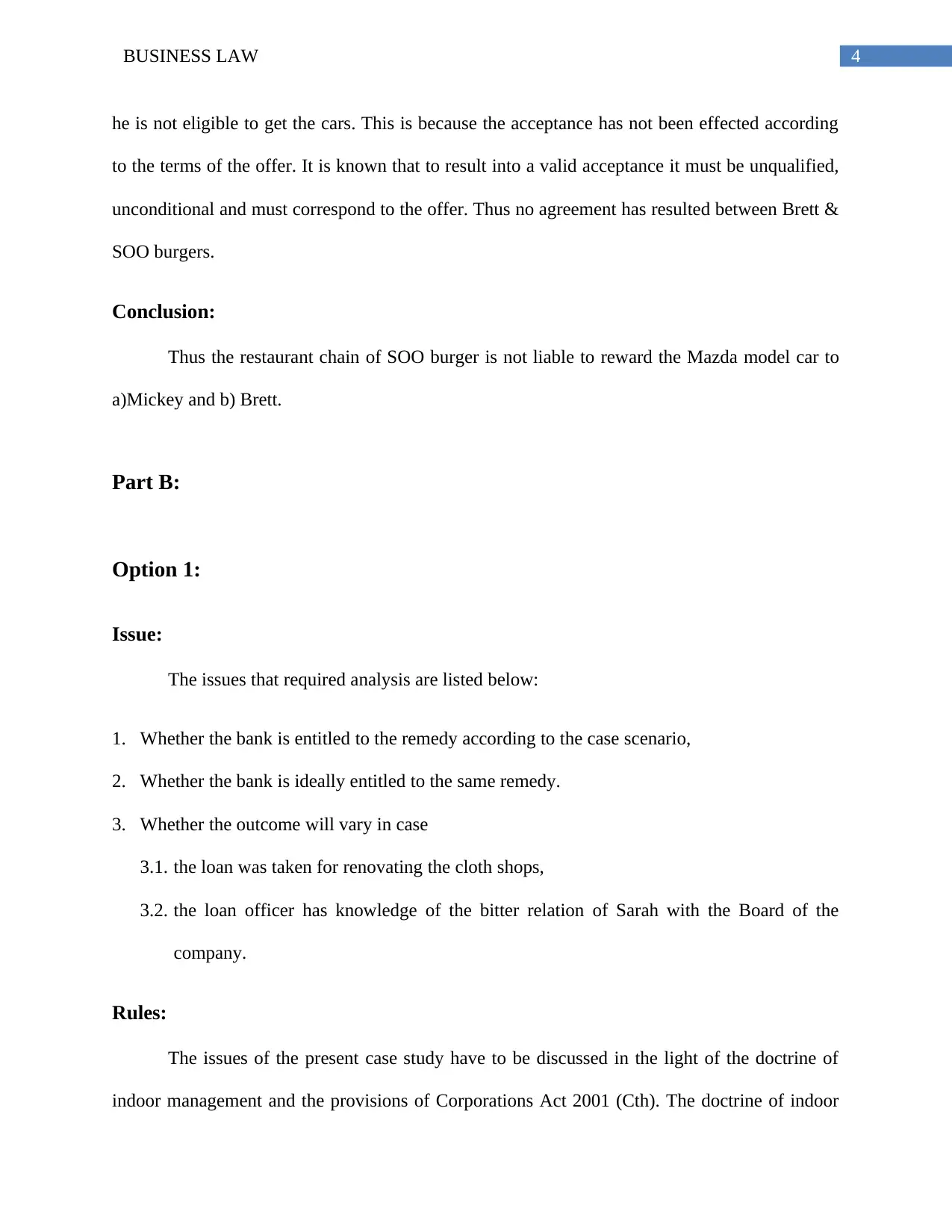
4BUSINESS LAW
he is not eligible to get the cars. This is because the acceptance has not been effected according
to the terms of the offer. It is known that to result into a valid acceptance it must be unqualified,
unconditional and must correspond to the offer. Thus no agreement has resulted between Brett &
SOO burgers.
Conclusion:
Thus the restaurant chain of SOO burger is not liable to reward the Mazda model car to
a)Mickey and b) Brett.
Part B:
Option 1:
Issue:
The issues that required analysis are listed below:
1. Whether the bank is entitled to the remedy according to the case scenario,
2. Whether the bank is ideally entitled to the same remedy.
3. Whether the outcome will vary in case
3.1. the loan was taken for renovating the cloth shops,
3.2. the loan officer has knowledge of the bitter relation of Sarah with the Board of the
company.
Rules:
The issues of the present case study have to be discussed in the light of the doctrine of
indoor management and the provisions of Corporations Act 2001 (Cth). The doctrine of indoor
he is not eligible to get the cars. This is because the acceptance has not been effected according
to the terms of the offer. It is known that to result into a valid acceptance it must be unqualified,
unconditional and must correspond to the offer. Thus no agreement has resulted between Brett &
SOO burgers.
Conclusion:
Thus the restaurant chain of SOO burger is not liable to reward the Mazda model car to
a)Mickey and b) Brett.
Part B:
Option 1:
Issue:
The issues that required analysis are listed below:
1. Whether the bank is entitled to the remedy according to the case scenario,
2. Whether the bank is ideally entitled to the same remedy.
3. Whether the outcome will vary in case
3.1. the loan was taken for renovating the cloth shops,
3.2. the loan officer has knowledge of the bitter relation of Sarah with the Board of the
company.
Rules:
The issues of the present case study have to be discussed in the light of the doctrine of
indoor management and the provisions of Corporations Act 2001 (Cth). The doctrine of indoor
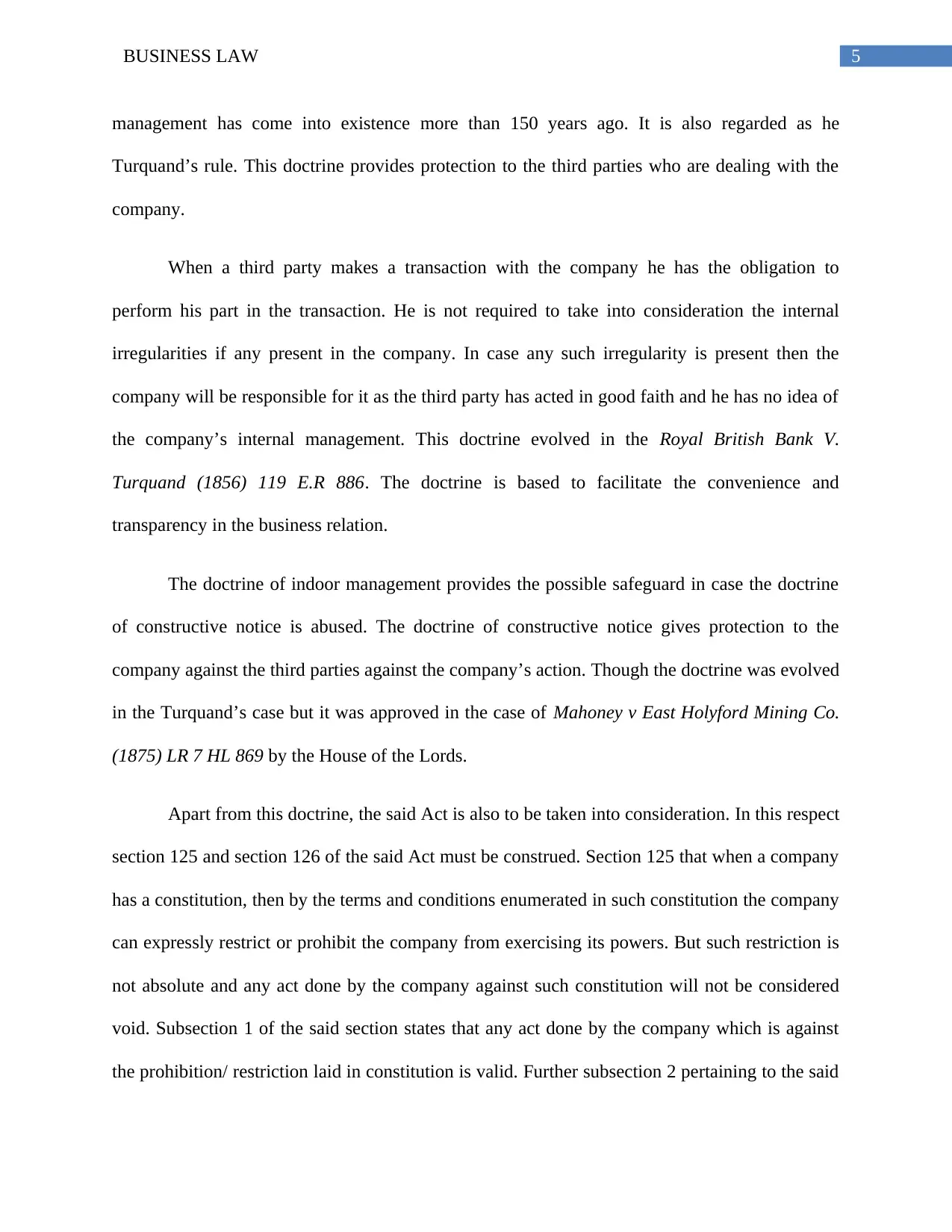
5BUSINESS LAW
management has come into existence more than 150 years ago. It is also regarded as he
Turquand’s rule. This doctrine provides protection to the third parties who are dealing with the
company.
When a third party makes a transaction with the company he has the obligation to
perform his part in the transaction. He is not required to take into consideration the internal
irregularities if any present in the company. In case any such irregularity is present then the
company will be responsible for it as the third party has acted in good faith and he has no idea of
the company’s internal management. This doctrine evolved in the Royal British Bank V.
Turquand (1856) 119 E.R 886. The doctrine is based to facilitate the convenience and
transparency in the business relation.
The doctrine of indoor management provides the possible safeguard in case the doctrine
of constructive notice is abused. The doctrine of constructive notice gives protection to the
company against the third parties against the company’s action. Though the doctrine was evolved
in the Turquand’s case but it was approved in the case of Mahoney v East Holyford Mining Co.
(1875) LR 7 HL 869 by the House of the Lords.
Apart from this doctrine, the said Act is also to be taken into consideration. In this respect
section 125 and section 126 of the said Act must be construed. Section 125 that when a company
has a constitution, then by the terms and conditions enumerated in such constitution the company
can expressly restrict or prohibit the company from exercising its powers. But such restriction is
not absolute and any act done by the company against such constitution will not be considered
void. Subsection 1 of the said section states that any act done by the company which is against
the prohibition/ restriction laid in constitution is valid. Further subsection 2 pertaining to the said
management has come into existence more than 150 years ago. It is also regarded as he
Turquand’s rule. This doctrine provides protection to the third parties who are dealing with the
company.
When a third party makes a transaction with the company he has the obligation to
perform his part in the transaction. He is not required to take into consideration the internal
irregularities if any present in the company. In case any such irregularity is present then the
company will be responsible for it as the third party has acted in good faith and he has no idea of
the company’s internal management. This doctrine evolved in the Royal British Bank V.
Turquand (1856) 119 E.R 886. The doctrine is based to facilitate the convenience and
transparency in the business relation.
The doctrine of indoor management provides the possible safeguard in case the doctrine
of constructive notice is abused. The doctrine of constructive notice gives protection to the
company against the third parties against the company’s action. Though the doctrine was evolved
in the Turquand’s case but it was approved in the case of Mahoney v East Holyford Mining Co.
(1875) LR 7 HL 869 by the House of the Lords.
Apart from this doctrine, the said Act is also to be taken into consideration. In this respect
section 125 and section 126 of the said Act must be construed. Section 125 that when a company
has a constitution, then by the terms and conditions enumerated in such constitution the company
can expressly restrict or prohibit the company from exercising its powers. But such restriction is
not absolute and any act done by the company against such constitution will not be considered
void. Subsection 1 of the said section states that any act done by the company which is against
the prohibition/ restriction laid in constitution is valid. Further subsection 2 pertaining to the said
⊘ This is a preview!⊘
Do you want full access?
Subscribe today to unlock all pages.

Trusted by 1+ million students worldwide
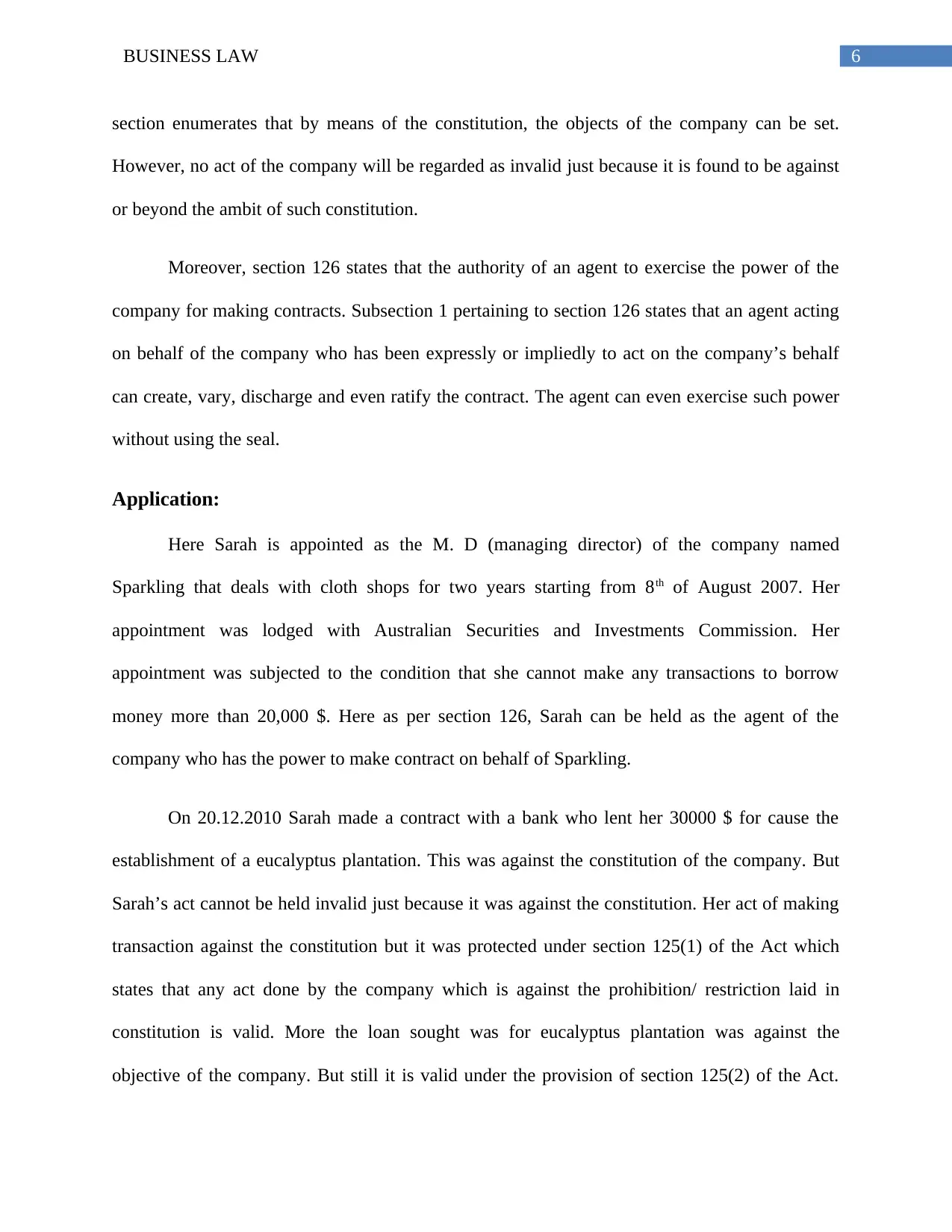
6BUSINESS LAW
section enumerates that by means of the constitution, the objects of the company can be set.
However, no act of the company will be regarded as invalid just because it is found to be against
or beyond the ambit of such constitution.
Moreover, section 126 states that the authority of an agent to exercise the power of the
company for making contracts. Subsection 1 pertaining to section 126 states that an agent acting
on behalf of the company who has been expressly or impliedly to act on the company’s behalf
can create, vary, discharge and even ratify the contract. The agent can even exercise such power
without using the seal.
Application:
Here Sarah is appointed as the M. D (managing director) of the company named
Sparkling that deals with cloth shops for two years starting from 8th of August 2007. Her
appointment was lodged with Australian Securities and Investments Commission. Her
appointment was subjected to the condition that she cannot make any transactions to borrow
money more than 20,000 $. Here as per section 126, Sarah can be held as the agent of the
company who has the power to make contract on behalf of Sparkling.
On 20.12.2010 Sarah made a contract with a bank who lent her 30000 $ for cause the
establishment of a eucalyptus plantation. This was against the constitution of the company. But
Sarah’s act cannot be held invalid just because it was against the constitution. Her act of making
transaction against the constitution but it was protected under section 125(1) of the Act which
states that any act done by the company which is against the prohibition/ restriction laid in
constitution is valid. More the loan sought was for eucalyptus plantation was against the
objective of the company. But still it is valid under the provision of section 125(2) of the Act.
section enumerates that by means of the constitution, the objects of the company can be set.
However, no act of the company will be regarded as invalid just because it is found to be against
or beyond the ambit of such constitution.
Moreover, section 126 states that the authority of an agent to exercise the power of the
company for making contracts. Subsection 1 pertaining to section 126 states that an agent acting
on behalf of the company who has been expressly or impliedly to act on the company’s behalf
can create, vary, discharge and even ratify the contract. The agent can even exercise such power
without using the seal.
Application:
Here Sarah is appointed as the M. D (managing director) of the company named
Sparkling that deals with cloth shops for two years starting from 8th of August 2007. Her
appointment was lodged with Australian Securities and Investments Commission. Her
appointment was subjected to the condition that she cannot make any transactions to borrow
money more than 20,000 $. Here as per section 126, Sarah can be held as the agent of the
company who has the power to make contract on behalf of Sparkling.
On 20.12.2010 Sarah made a contract with a bank who lent her 30000 $ for cause the
establishment of a eucalyptus plantation. This was against the constitution of the company. But
Sarah’s act cannot be held invalid just because it was against the constitution. Her act of making
transaction against the constitution but it was protected under section 125(1) of the Act which
states that any act done by the company which is against the prohibition/ restriction laid in
constitution is valid. More the loan sought was for eucalyptus plantation was against the
objective of the company. But still it is valid under the provision of section 125(2) of the Act.
Paraphrase This Document
Need a fresh take? Get an instant paraphrase of this document with our AI Paraphraser
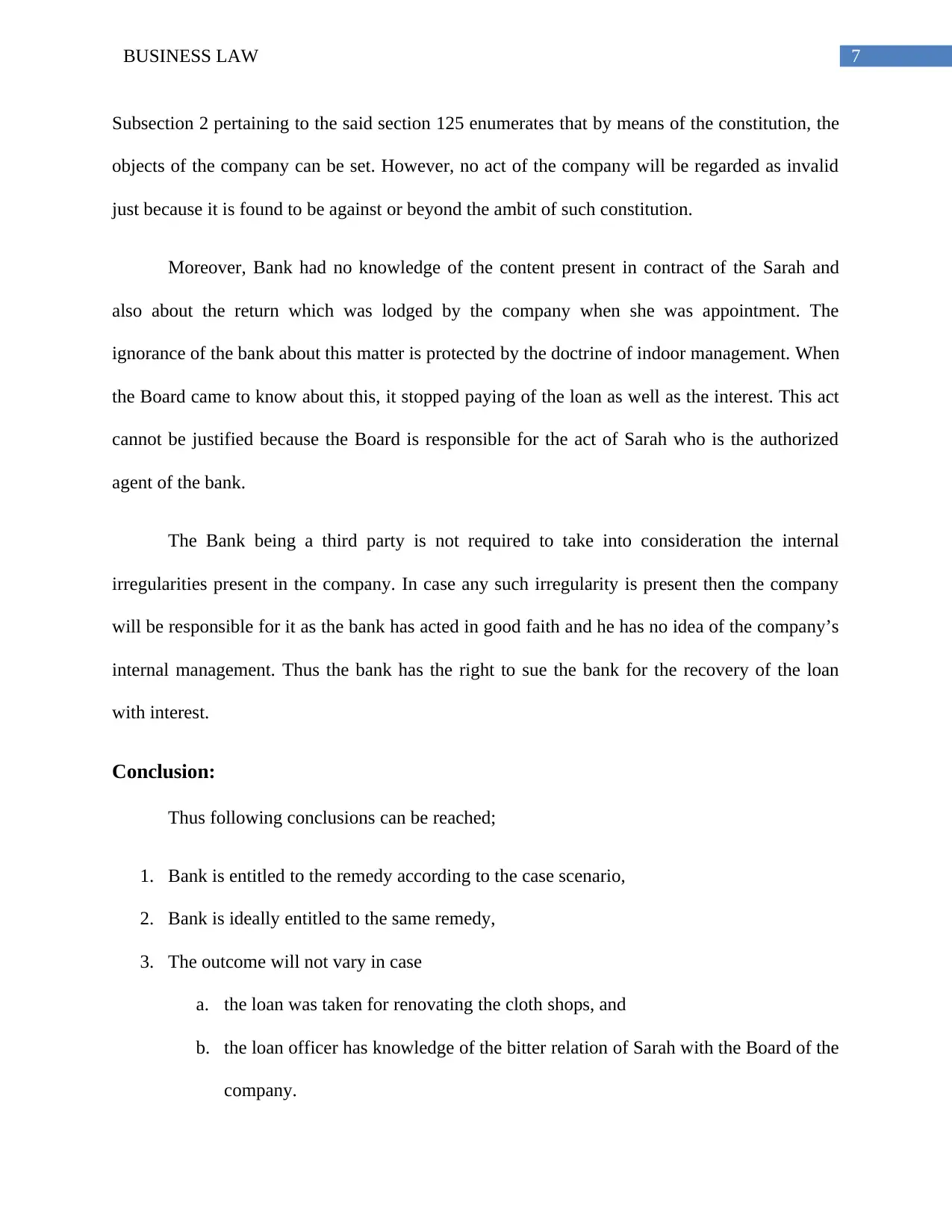
7BUSINESS LAW
Subsection 2 pertaining to the said section 125 enumerates that by means of the constitution, the
objects of the company can be set. However, no act of the company will be regarded as invalid
just because it is found to be against or beyond the ambit of such constitution.
Moreover, Bank had no knowledge of the content present in contract of the Sarah and
also about the return which was lodged by the company when she was appointment. The
ignorance of the bank about this matter is protected by the doctrine of indoor management. When
the Board came to know about this, it stopped paying of the loan as well as the interest. This act
cannot be justified because the Board is responsible for the act of Sarah who is the authorized
agent of the bank.
The Bank being a third party is not required to take into consideration the internal
irregularities present in the company. In case any such irregularity is present then the company
will be responsible for it as the bank has acted in good faith and he has no idea of the company’s
internal management. Thus the bank has the right to sue the bank for the recovery of the loan
with interest.
Conclusion:
Thus following conclusions can be reached;
1. Bank is entitled to the remedy according to the case scenario,
2. Bank is ideally entitled to the same remedy,
3. The outcome will not vary in case
a. the loan was taken for renovating the cloth shops, and
b. the loan officer has knowledge of the bitter relation of Sarah with the Board of the
company.
Subsection 2 pertaining to the said section 125 enumerates that by means of the constitution, the
objects of the company can be set. However, no act of the company will be regarded as invalid
just because it is found to be against or beyond the ambit of such constitution.
Moreover, Bank had no knowledge of the content present in contract of the Sarah and
also about the return which was lodged by the company when she was appointment. The
ignorance of the bank about this matter is protected by the doctrine of indoor management. When
the Board came to know about this, it stopped paying of the loan as well as the interest. This act
cannot be justified because the Board is responsible for the act of Sarah who is the authorized
agent of the bank.
The Bank being a third party is not required to take into consideration the internal
irregularities present in the company. In case any such irregularity is present then the company
will be responsible for it as the bank has acted in good faith and he has no idea of the company’s
internal management. Thus the bank has the right to sue the bank for the recovery of the loan
with interest.
Conclusion:
Thus following conclusions can be reached;
1. Bank is entitled to the remedy according to the case scenario,
2. Bank is ideally entitled to the same remedy,
3. The outcome will not vary in case
a. the loan was taken for renovating the cloth shops, and
b. the loan officer has knowledge of the bitter relation of Sarah with the Board of the
company.
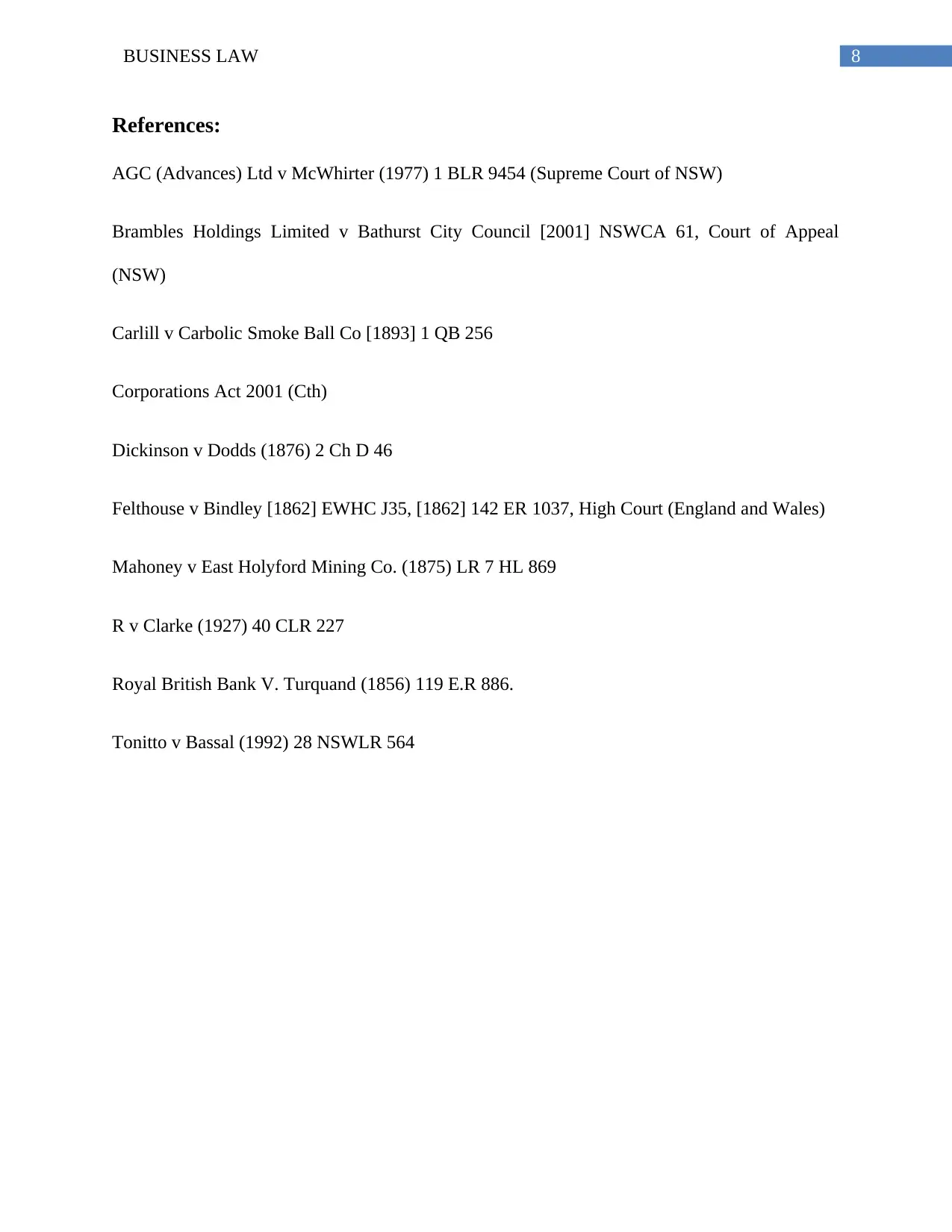
8BUSINESS LAW
References:
AGC (Advances) Ltd v McWhirter (1977) 1 BLR 9454 (Supreme Court of NSW)
Brambles Holdings Limited v Bathurst City Council [2001] NSWCA 61, Court of Appeal
(NSW)
Carlill v Carbolic Smoke Ball Co [1893] 1 QB 256
Corporations Act 2001 (Cth)
Dickinson v Dodds (1876) 2 Ch D 46
Felthouse v Bindley [1862] EWHC J35, [1862] 142 ER 1037, High Court (England and Wales)
Mahoney v East Holyford Mining Co. (1875) LR 7 HL 869
R v Clarke (1927) 40 CLR 227
Royal British Bank V. Turquand (1856) 119 E.R 886.
Tonitto v Bassal (1992) 28 NSWLR 564
References:
AGC (Advances) Ltd v McWhirter (1977) 1 BLR 9454 (Supreme Court of NSW)
Brambles Holdings Limited v Bathurst City Council [2001] NSWCA 61, Court of Appeal
(NSW)
Carlill v Carbolic Smoke Ball Co [1893] 1 QB 256
Corporations Act 2001 (Cth)
Dickinson v Dodds (1876) 2 Ch D 46
Felthouse v Bindley [1862] EWHC J35, [1862] 142 ER 1037, High Court (England and Wales)
Mahoney v East Holyford Mining Co. (1875) LR 7 HL 869
R v Clarke (1927) 40 CLR 227
Royal British Bank V. Turquand (1856) 119 E.R 886.
Tonitto v Bassal (1992) 28 NSWLR 564
⊘ This is a preview!⊘
Do you want full access?
Subscribe today to unlock all pages.

Trusted by 1+ million students worldwide
1 out of 9
Related Documents
Your All-in-One AI-Powered Toolkit for Academic Success.
+13062052269
info@desklib.com
Available 24*7 on WhatsApp / Email
![[object Object]](/_next/static/media/star-bottom.7253800d.svg)
Unlock your academic potential
Copyright © 2020–2026 A2Z Services. All Rights Reserved. Developed and managed by ZUCOL.




